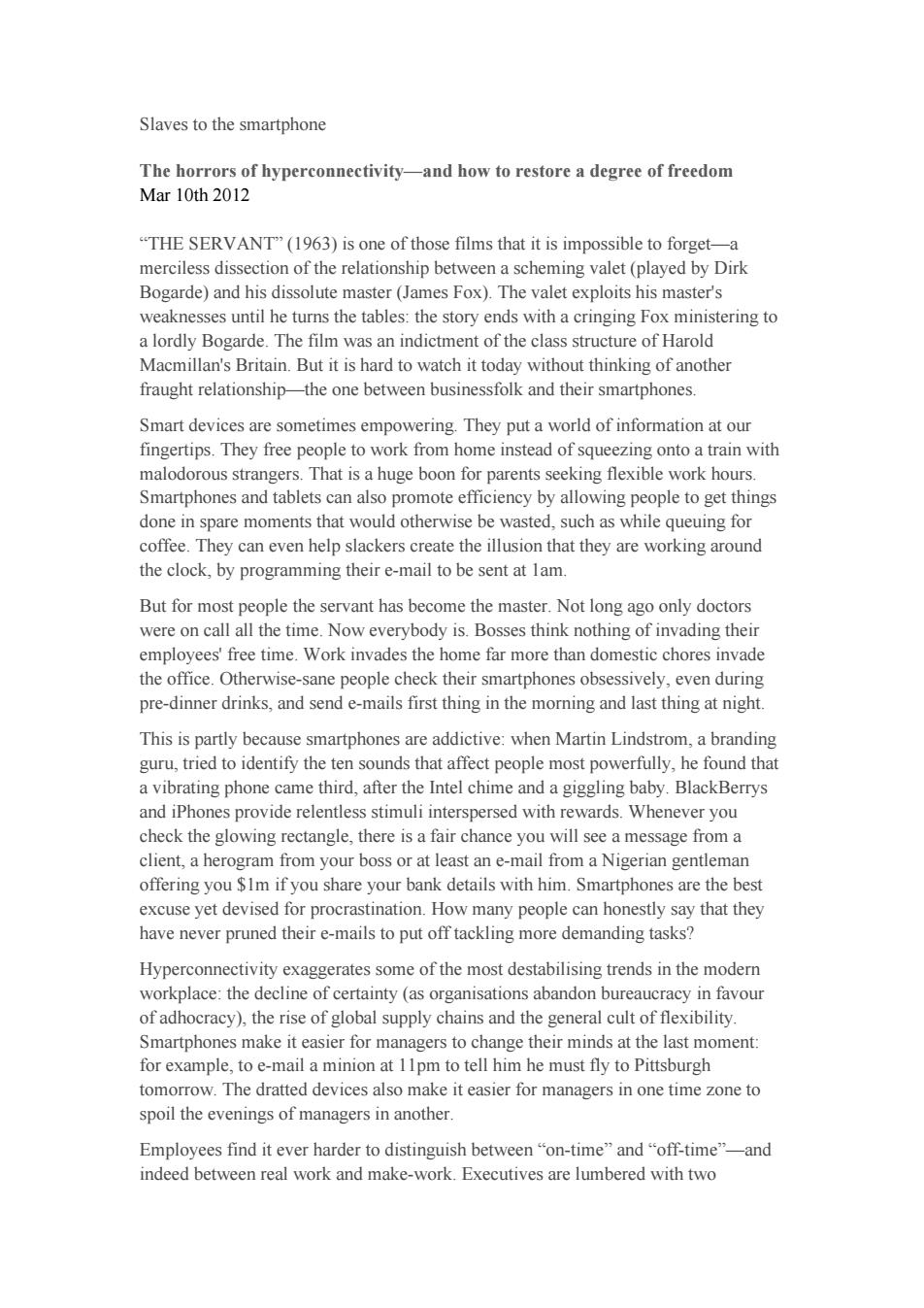正在加载图片...

Slaves to the smartphone The horrors of hyperconnectivity-and how to restore a degree of freedom Mar 10th 2012 "THE SERVANT"(1963)is one of those films that it is impossible to forget-a merciless dissection of the relationship between a scheming valet(played by Dirk Bogarde)and his dissolute master(James Fox).The valet exploits his master's weaknesses until he turns the tables:the story ends with a cringing Fox ministering to a lordly Bogarde.The film was an indictment of the class structure of Harold Macmillan's Britain.But it is hard to watch it today without thinking of another fraught relationship-the one between businessfolk and their smartphones Smart devices are sometimes empowering.They put a world of information at our fingertips.They free people to work from home instead of squeezing onto a train with malodorous strangers.That is a huge boon for parents seeking flexible work hours. Smartphones and tablets can also promote efficiency by allowing people to get things done in spare moments that would otherwise be wasted,such as while queuing for coffee.They can even help slackers create the illusion that they are working around the clock,by programming their e-mail to be sent at lam. But for most people the servant has become the master.Not long ago only doctors were on call all the time.Now everybody is.Bosses think nothing of invading their employees'free time.Work invades the home far more than domestic chores invade the office.Otherwise-sane people check their smartphones obsessively,even during pre-dinner drinks,and send e-mails first thing in the morning and last thing at night. This is partly because smartphones are addictive:when Martin Lindstrom,a branding guru,tried to identify the ten sounds that affect people most powerfully,he found that a vibrating phone came third,after the Intel chime and a giggling baby.BlackBerrys and iPhones provide relentless stimuli interspersed with rewards.Whenever you check the glowing rectangle,there is a fair chance you will see a message from a client,a herogram from your boss or at least an e-mail from a Nigerian gentleman offering you $Im if you share your bank details with him.Smartphones are the best excuse yet devised for procrastination.How many people can honestly say that they have never pruned their e-mails to put off tackling more demanding tasks? Hyperconnectivity exaggerates some of the most destabilising trends in the modern workplace:the decline of certainty(as organisations abandon bureaucracy in favour of adhocracy),the rise of global supply chains and the general cult of flexibility. Smartphones make it easier for managers to change their minds at the last moment: for example,to e-mail a minion at 11pm to tell him he must fly to Pittsburgh tomorrow.The dratted devices also make it easier for managers in one time zone to spoil the evenings of managers in another. Employees find it ever harder to distinguish between“on-time”and“off-time”-and indeed between real work and make-work.Executives are lumbered with twoSlaves to the smartphone The horrors of hyperconnectivity—and how to restore a degree of freedom Mar 10th 2012 “THE SERVANT” (1963) is one of those films that it is impossible to forget—a merciless dissection of the relationship between a scheming valet (played by Dirk Bogarde) and his dissolute master (James Fox). The valet exploits his master's weaknesses until he turns the tables: the story ends with a cringing Fox ministering to a lordly Bogarde. The film was an indictment of the class structure of Harold Macmillan's Britain. But it is hard to watch it today without thinking of another fraught relationship—the one between businessfolk and their smartphones. Smart devices are sometimes empowering. They put a world of information at our fingertips. They free people to work from home instead of squeezing onto a train with malodorous strangers. That is a huge boon for parents seeking flexible work hours. Smartphones and tablets can also promote efficiency by allowing people to get things done in spare moments that would otherwise be wasted, such as while queuing for coffee. They can even help slackers create the illusion that they are working around the clock, by programming their e-mail to be sent at 1am. But for most people the servant has become the master. Not long ago only doctors were on call all the time. Now everybody is. Bosses think nothing of invading their employees' free time. Work invades the home far more than domestic chores invade the office. Otherwise-sane people check their smartphones obsessively, even during pre-dinner drinks, and send e-mails first thing in the morning and last thing at night. This is partly because smartphones are addictive: when Martin Lindstrom, a branding guru, tried to identify the ten sounds that affect people most powerfully, he found that a vibrating phone came third, after the Intel chime and a giggling baby. BlackBerrys and iPhones provide relentless stimuli interspersed with rewards. Whenever you check the glowing rectangle, there is a fair chance you will see a message from a client, a herogram from your boss or at least an e-mail from a Nigerian gentleman offering you $1m if you share your bank details with him. Smartphones are the best excuse yet devised for procrastination. How many people can honestly say that they have never pruned their e-mails to put off tackling more demanding tasks? Hyperconnectivity exaggerates some of the most destabilising trends in the modern workplace: the decline of certainty (as organisations abandon bureaucracy in favour of adhocracy), the rise of global supply chains and the general cult of flexibility. Smartphones make it easier for managers to change their minds at the last moment: for example, to e-mail a minion at 11pm to tell him he must fly to Pittsburgh tomorrow. The dratted devices also make it easier for managers in one time zone to spoil the evenings of managers in another. Employees find it ever harder to distinguish between “on-time” and “off-time”—and indeed between real work and make-work. Executives are lumbered with two